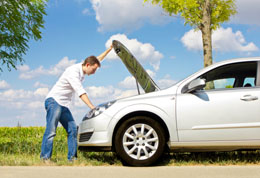
There are many people who use cars to commute daily and it is surely very irritating if the car has some engine problem and breaks down before reaching your destination. If the car breaks down, diagnosing a car engine problem can be an easy task for the driver, if he has some basic knowledge of engine problems and car troubleshooting.
Engine Start-up Problem
- Ensure that you have enough gas in your car.
- When you try to start the car, check if there is a cranky noise. If there is no such noise, then you need to check the battery and insure that there is no wiring problem. Before removing battery terminals, observe positive and negative terminals of the battery and then try to tighten them; or unplug, clean and join the terminals again. A low battery can be judged by dim lights, low horn, slow or no movement of windscreen wipers, etc. and needs to be recharged.
- If the battery is fine, you need to check the starter as it may have to be repaired or replaced.
- If the engine starts but stops; in the case of cars having carb engines, you need to check the choke. Start the engine, press the accelerator lightly, and rev up the engine till it is heated. But if you own a fuel-injected car, there can be many issues such as a vacuum hose leak, or at the air valve or fuel pressure regulator.
Engine Overheats Quickly
If the engine overheats after driving for sometime or a mile, then there may be a possibility of some smoke or steam coming out from the hood.
- Check and adjust the ignition timing as it can be wrongly set.
- Check if there are any mechanical problems in the engine; such as compression, and insure proper working of thermostat that regulates the temperature.
- The level of the engine coolant can be low, and if it is, it should be refilled to a proper level. Examine if there’s a leak in the cooling system and repair it as soon as possible.
- The cylinder head gasket needs to be replaced as it may have conked out.
- The drive belts of the engine may be slipping or broken, tighten or replace them if needed.
Backfiring Engines
When you start the engine and accelerate, you hear a continuous noise like fire crackers from the silencer of your vehicle, that’s how the engine backfires which can be harmful to the engine.
- You need to check for a broken or a burnt valve. A broken camshaft can also be a problem and should be repaired to avoid serious engine issues.
- The ignition timing may need to be adjusted.
- The timing chain or belt of the camshaft may have been slipped, and needs to be replaced at the earliest.
- The wiring of the spark plug may not be proper. Adjust the wiring in a proper way and check the firing noise.
No Increase in the Car’s Speed or Acceleration
When you accelerate, the power that the car is supposed to have, is not being generated. The car can even stall when the gas pedal is pressed for acceleration.
- Replace the air filter as it may be dirty or the fuel filter as it may be choked.
- There may be water in the gasoline. Empty the gas tank and fill it with clean gas.
- Check if your catalytic converter is choked. If it is, it has to be replaced.
These are some common car troubleshooting steps that can be taken when needed. Diagnosing car engine problems and treating them as early as possible can avoid severe failures and can also help increase the life of the engine. Periodical servicing and maintenance of the car helps it to give the best performance without breakdown problems.